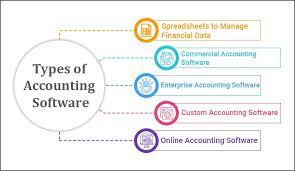Introduction:
In the dynamic landscape of financial management, accounting software plays a pivotal role in streamlining processes, enhancing accuracy, and promoting efficiency. Businesses of all sizes leverage various types of accounting software to meet their unique needs. This article delves into the diverse world of accounting software, highlighting different types and their specific functionalities.
- General Accounting Software: General accounting software serves as the foundational tool for managing basic financial tasks. It includes features such as general ledger, accounts payable, accounts receivable, and financial reporting. Examples include QuickBooks, Xero, and FreshBooks. These applications are suitable for small to medium-sized businesses with standard accounting requirements.
- Enterprise Resource Planning (ERP) Systems: ERP systems integrate various business processes, including accounting, inventory management, human resources, and more. They are designed for larger enterprises that require a comprehensive solution to manage all aspects of their operations. Examples include SAP, Oracle NetSuite, and Microsoft Dynamics.
- Cloud-Based Accounting Software: Cloud-based accounting software allows users to access their financial data anytime, anywhere, as long as they have an internet connection. This type of software is scalable and often offers automatic updates, making it an attractive choice for businesses looking for flexibility and mobility. Examples include QuickBooks Online, Xero, and Zoho Books.
- Specialized Accounting Software: Some businesses have unique accounting needs that require specialized software. For example, project accounting software is designed for businesses that manage multiple projects, while nonprofit organizations may use fund accounting software to track donations and grants separately. Examples include FreshBooks for project accounting and Aplos for nonprofit fund accounting.
- Tax Accounting Software: Tax accounting software is designed to streamline the process of preparing and filing taxes. These tools often integrate with general accounting software to ensure accurate and compliant tax reporting. TurboTax and H&R Block are examples of popular tax accounting software used by individuals, while corporate tax software like Thomson Reuters ONESOURCE is employed by businesses.
- Freemium Accounting Software: Freemium accounting software provides basic accounting features for free, with the option to upgrade for advanced functionalities. This type of software is often suitable for startups and small businesses with limited budgets. Wave Accounting and ZipBooks are examples of freemium accounting software.
- Open-Source Accounting Software: Open-source accounting software is developed collaboratively, allowing users to modify and customize the software according to their specific requirements. This type of software is often free to use and can be a cost-effective solution for businesses with in-house technical expertise. Examples include GnuCash and FrontAccounting.
Conclusion:
Selecting the right accounting software is crucial for businesses to effectively manage their finances. The diverse types of accounting software cater to a wide range of needs, from basic bookkeeping to comprehensive enterprise-level solutions. By understanding the unique features of each type, businesses can make informed decisions that align with their specific requirements and contribute to their overall financial success.

